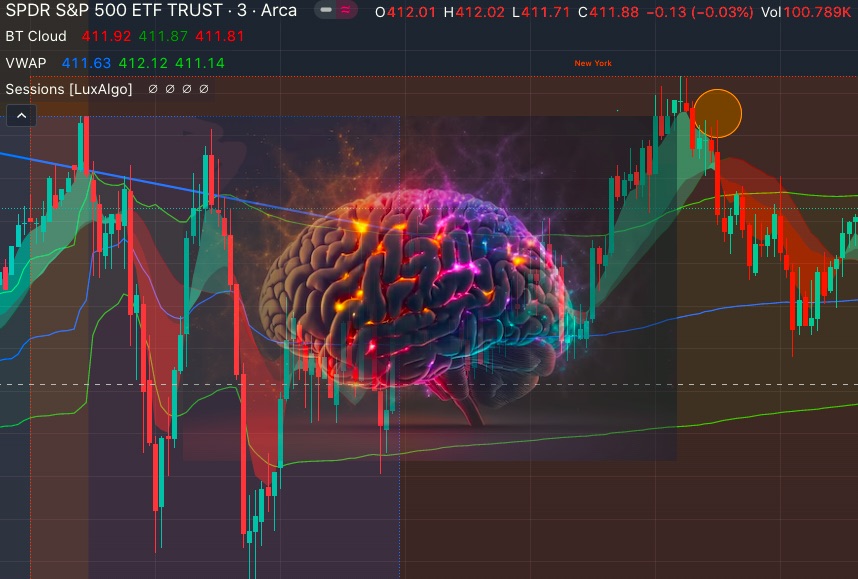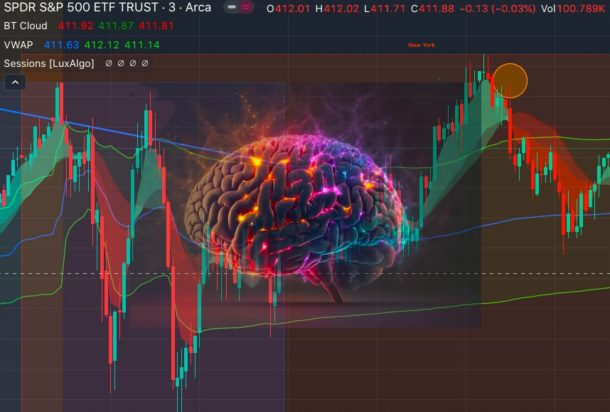Trading in the financial markets can be a highly lucrative venture, but it's also a game of patience, skill, and discipline. Success in trading requires more than just having a solid strategy; it requires a trader to be aware of their psychological state and how it can impact their decision-making.
The psychology of trading is a fascinating subject that's been studied extensively over the years. In this post, we'll explore seven psychological trading tips and traps that every trader should be aware of.
Keep Your Emotions in Check
Trading can be an emotional rollercoaster, with highs and lows that can impact a trader's decision-making. Fear, greed, and anxiety are all common emotions that can cause a trader to make impulsive decisions that result in losses.
To become a successful trader, it's crucial to keep your emotions in check. This means learning to detach yourself from the emotional highs and lows of trading and making decisions based on logic and reason rather than fear or greed.
One way to keep emotions in check is to have a solid trading plan in place. By having a plan that you can rely on, you'll be less likely to make impulsive decisions based on emotions.
Stick to a Trading Plan
A trading plan is a set of rules that a trader follows to make informed trading decisions. A well-defined trading plan helps you stay focused and disciplined, preventing impulsive decisions. It also helps you avoid trading on emotions, as you have a set of rules to follow.
A good trading plan should include entry and exit points, risk management strategies, and a list of trading instruments to focus on. By sticking to a plan, you'll be able to minimize the impact of emotions on your trading decisions and increase your chances of success.
Manage Risk
Risk management is a critical aspect of trading that's often overlooked by novice traders. In trading, there's always a risk of losing money, and it's essential to manage that risk to avoid significant losses.
One way to manage risk is to set a stop loss. A stop loss is a predetermined price point at which you'll close your position if the market moves against you. By setting a stop loss, you'll be able to limit your losses and protect your trading capital.
Another way to manage risk is to limit your trades to a percentage of your account balance. This means that you'll only risk a small percentage of your capital on each trade, reducing the impact of any losses.
Don't Chase Losses
Trading losses are a natural part of the game, and it's essential to learn how to deal with them. One of the biggest mistakes that traders make is trying to recover their losses by making more trades.
Trying to recover your losses can lead to a downward spiral, causing you to make more significant losses. This is known as the "revenge trading" trap, and it's something that every trader should avoid.
To avoid this trap, it's essential to cut your losses and move on to the next trade. Don't try to recover your losses by making more trades; instead, focus on your trading plan and wait for the next opportunity to present itself.
Take Breaks
Trading can be a stressful activity, and it's essential to take breaks to reduce stress and stay focused. Taking breaks can also help you avoid burnout and make better decisions.
One way to take breaks is to set a timer for 25 minutes and take a five-minute break after each session. During your break, you can stretch, meditate, or do something that relaxes you.
It's also important to take longer breaks to recharge your batteries. Take a day or two off from trading each week.
To top up your trading skills, consider joining TopStep where they give you training and a funded account to trade with!
Stay Informed
Keeping up-to-date with the latest news and events that could impact the markets is essential for any trader. Having a good understanding of market conditions can help you make more informed trading decisions.
There are various ways to stay informed, such as following financial news websites, subscribing to newsletters, and attending trading seminars. It's also essential to keep an eye on economic indicators, such as GDP growth, inflation, and unemployment rates.
By staying informed, you'll be able to anticipate market trends and make more informed trading decisions.
Avoid Overconfidence
Overconfidence is a common trap that many traders fall into, especially after a string of successful trades. Overconfidence can lead to overtrading and taking on too much risk, which can ultimately result in significant losses.
To avoid overconfidence, it's important to stay grounded and maintain a level head. Don't make rash decisions based on past successes, and always stick to your trading plan.
It's also crucial to keep a record of your trades and analyze them regularly. This will help you identify any mistakes you've made and learn from them.
Becoming a successful trader takes time, patience, and a lot of practice. By following these seven psychological trading tips and avoiding common traps, you can improve your chances of success in the markets.
Remember to keep your emotions in check, stick to a trading plan, manage risk, avoid chasing losses, take breaks, stay informed, and avoid overconfidence. With these tips in mind, you'll be well on your way to becoming a better trader.
To top up your trading skills, consider joining TopStep where they give you training and a funded account to trade with if you pass the tests!

Ways to Your Impact Your Business with AI: Transforming Industries and Operations
Artificial Intelligence (AI) has emerged as a transformative force in the business world, revolutionizing workflows, methodologies, and entire industries. By mimicking human intelligence through sophisticated algorithms and technologies, AI is reshaping how companies...

What is a “Woke Mind Virus”: Unpacking a Concept in Modern Discourse
In recent years, the term "woke mind virus" has ignited intense debates across political and cultural landscapes. But what does it really mean? Where did it originate? And why is it causing such a stir? In this article, we'll break down the concept, explore its...

Summary of Elon Musk & Dr Jordan Peterson interview – The Woke Mind Virus is a Threat to Civilization
In a discussion between Dr. Jordan B. Peterson and Elon Musk. Musk and Peterson speak about the concept of the "woke mind virus" and its implications for society. Here is Elon Musk talking about losing his son to the woke mind virus. Here is a short clip & a...

The 5-Day Re-Invent Meditation Retreat in Sedona, Arizona
Nestled in the heart of Sedona, Arizona, a transformative experience awaits those seeking to reconnect with their inner selves and tap into the powerful energies of the Earth. The 5-Day Re-Invent Meditation Retreat offers a unique blend of Kundalini Yoga, vortex...

Top Audiobook Recommendations of Elon Musk.
Elon Musk replied to a tweet that had asked for audiobook recommendations. The Story of Civilization by DurantIliad (Penguin Edition)The Road to Serfdom by HayekAmerican Caesar by ManchesterMasters of Doom by KushnerThe Wages of Destruction by ToozeThe Storm of Steel...

What are Valuable Skills to Build Now and For the Future?
The Essential Skills for Success in the Modern Workplace and Beyond The skills required for success in the workplace are constantly changing. As we navigate through 2024 and look towards the future, it's crucial to understand which skills are most valuable now and...

The Impact of TikTok on Mental Health: A Comprehensive Analysis
TikTok has emerged as one of the most popular social media platforms, particularly among younger generations. With its short-form video content and highly engaging algorithm, TikTok has captured the attention of millions worldwide. However, as with any social media...

The Double-Edged Sword: Is Social Media Good or Bad for Mental Health?
Social media seems to have become an essential part of daily life. From scrolling through Instagram to sharing updates on Facebook, these platforms have changed how we communicate, get information, and see the world. But as social media use grows, we need to ask: Is...

The Impact of TikTok on Brain Health: What You Need to Know
Social media platforms have become an integral part of our daily lives. Among these, TikTok has emerged as a global phenomenon, captivating millions with its short-form, engaging videos. However, as with any technological...

How to Cure PTSD Four Times in 5 Hours
This case study shows how a non-drug intervention can be successfully used to cure PTSD in a Vietnam veteran in under 5 hours. 'Carl, our pseudonymous client, met criteria for at least one Diagnostic and Statistical Manual of Mental Disorders (DSM IV) Criterion A...

Audiobooks Market Booming: How to Capitalize on the $53 Billion Opportunity by 2032
The audiobooks industry is experiencing significant growth and presents a promising sales trend to capitalize on for the following reasons: 1. The global audiobooks market was valued at around $6.7-$6.8 billion in 2023, and is projected to grow at a staggering CAGR...

Synesthesia, Writing, Filmmaking and the Falcon.
Synesthesia is a neurological condition where stimulation of one sense automatically triggers an experience in another sense. The key points about synesthesia are: 1. It involves a blending or merging of the senses, where input to one sensory modality (e.g. hearing)...














